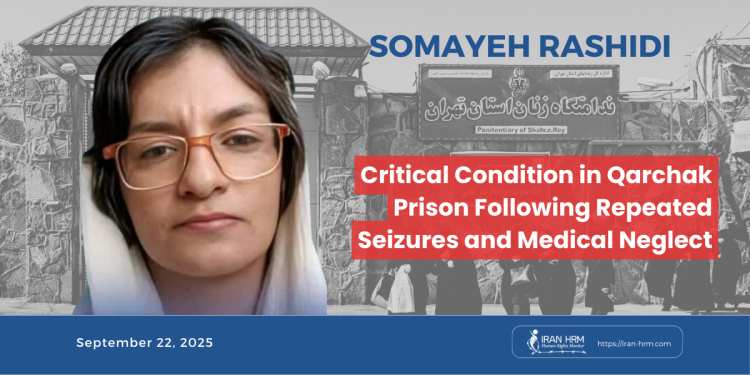Political prisoner Somayeh Rashidi is reportedly in critical condition after suffering multiple severe epileptic seizures in Qarchak Prison in Varamin. On September, 16, 2025, she was finally transferred to Mofatteh Hospital in Varamin, where doctors assessed her level of consciousness as dangerously low and described her physical condition as “critical and unstable.”
A Life-Threatening Illness Dismissed as “Faking”
Rashidi, a long-time epilepsy patient, had repeatedly reported symptoms including severe headaches and loss of consciousness since her arrest. Despite these ongoing complaints, prison medical staff consistently dismissed her condition as “faking”. The only medications she was given were general tranquilizers and psychiatric drugs, not appropriate treatment for epilepsy.
An informed source familiar with her condition stated:
“Somayeh had multiple seizures in front of other inmates, collapsing on the floor. But the prison doctor told her she was pretending. Only when her condition deteriorated significantly did they transfer her to the hospital — and even that happened with a delay. Her consciousness level is now at 5, and doctors have almost lost hope.”
This case highlights not only systematic medical neglect but also the way Iranian prison authorities allegedly use denial of medical care as a form of psychological torture, particularly against political prisoners.
Seizures and Delayed Hospital Transfer
On the day of her hospitalization, Rashidi experienced multiple consecutive seizures. Her fellow inmates tried to support her physically as she lost control of her body. The intensity of the episodes finally compelled prison officials to approve a hospital transfer, but only after hours of resistance and delays.
At Mofatteh Hospital, doctors quickly confirmed that Rashidi’s level of consciousness was dangerously low, and her condition unpredictable. Her family, after learning about her deteriorating state, rushed to the hospital, but, like many families of political prisoners, they faced strict restrictions on visitation and access to her medical status.
Arrested for Sloganeering, Transferred After Prison Bombing
Born in 1983 and a resident of Tehran, Somayeh Rashidi was arrested on (April 23, 2025, for allegedly writing anti-government slogans in the Javadieh neighborhood of Tehran. After two days of interrogation at the 15th Khordad Intelligence Detention Center, she was transferred to the women’s ward of Evin Prison.
However, following an Israeli missile strike on Evin Prison and the sudden relocation of dozens of female detainees, Rashidi was among those forcibly transferred to Qarchak Prison in Varamin. She now faces formal charges of “propaganda against the regime,” a charge frequently used in Iran to suppress peaceful expression and dissent.
Qarchak Prison: A Place That Breeds Illness
Qarchak Prison has a well-documented reputation as one of the worst detention facilities for women in Iran. Overcrowding, lack of hygiene, medication shortages, and violent treatment by staff have rendered the prison inhumane, even for healthy inmates. Those with existing health conditions, such as Rashidi, are particularly vulnerable.
Rashidi, like many others, has been detained in conditions that exacerbate illness rather than alleviate it. Fellow inmates report that even basic daily activities were only possible with help from others, as her condition had severely weakened her. Qarchak is not only ill-equipped to treat chronic illnesses — it is an environment that actively worsens them.







